


If you think you're un-loved...
The impact of Bob Geldof
In the 1970s the Boomtown Rats told us all manner of things about life and death through their particular brand of music that had all the rawness of punk, but with a little something extra, some quirk that made the difference to so many other pub bands trying their hardest at the time. Now I'm not going to try and work out all the quirks that made up the Rats and what they had to offer, that is for a true Rats fan to do. But I do know that one of those quirks, one piece in the puzzle, was their front man, Bob Geldof. And as much as I like the work of the Boomtown Rats, Bob Geldof has shown me a talent that is quite apart from the Rats, and one for which I admire wholeheartedly.
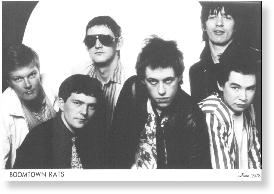 Geldof (third from the right) with the Boomtown Rats. |
After six albums, a worldwide smash in "I Don't Like Mondays", and a handful of other minor, and very minor, hits (including "Rat Trap", another British Number 1), the Boomtown Rats parted company and Bob Geldof went off to do his own thing. Musically, that has included four solo albums to date. Artistically, it included a starring role in film. And elsewhere, it involved changing the world and how we see it.
The Boomtown Rats can be dealt with very quickly (as I said, track down a Rats fan and ask them, or check out Bob's website) and simply. If you are keen, may I suggest the recent Best Of album (April 2004), and the aforementioned website has a much better biography of the Rats than I could ever manage. Geldof's solo career is covered equally well on the website, with a rundown of his albums and achievements. Might I suggest Vegetarians of Love and his most recent effort, Sex Age & Death. Two very good albums indeed.
When I had the pleasure of meeting Bob Geldof, although briefly, it wasn't the same Bob you see in press conferences, but rather the one in 'behind the scenes' documentaries; happy just to be a rock star. A shy, quiet man who was only too pleased to sit and chat a while with a small gathering of fans, looking ridiculously normal, despite his pinstriped suit. And apart from the chat we had, my other lasting memory is the sheepish grin he gave each time a female asked for, and then gave him, a kiss. He was a happy man that had not only enjoyed the performance he just given, but was equally pleased that a small group of fans had hung around long enough to say thanks.
One of the few autographs that I have sought out, getting Bob's on the fold out poster from the Wall DVD was extra special for me simply because when I think of Bob Geldof, I think of The Wall. The encounter went something like this:
Me: "Great show Bob, most enjoyable, thank you very much."
Bob: "Pleasure."
Me: "Would you sign this please?" (I hand Bob the poster from the Wall DVD; everyone else had bought his new CD to sign.)
Bob: "What's that from?"
Me: "It's the liftout from the DVD." (I show the DVD case to Mr. Geldof, with suitable awe that he was asking me questions!)
Bob: "Oh right, I didn't even know they'd released it like that yet." (He then gave me a happy smile, gladly taking the case and liftout, inspecting both, smiling and nodding approvingly, signing the picture of himself and returning it to me).
I then informed him of the bleeding obvious.
Me: "They did a good job putting it together. You're in it."
There was much laughter and merriment, followed by a quick handshake and farewell. So what brought me to that spot, and despite the chance to have various albums signed, I chose my copy of The Wall instead?
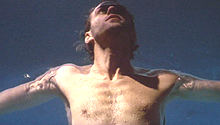 Geldof, who doesn't swim, had difficulty doing the pool scenes in The Wall. |
On the TV documentary "Pink Floyd: Behind The Wall" Roger Waters said, "There's a funny story attached to Bob joining the film". Roger and Bob go on to explain how Bob and his manager were in a cab on the way to the airport in London. Bob's manager was telling Bob what the deal was, and Bob describing why he wasn't particularly keen to do the film, in no uncertain terms and with a suitable amount of abuse and swearing towards Pink Floyd and their music. As it turned out, the cabby was none other than Roger's brother, who promptly got on the phone and told Roger the whole story. The rest, as they say, is history.
The DVD itself came with many extras, one being a 'making of' from the period of filming titled "The Other Side Of The Wall". Alan Parker: "By choosing Bob, we did give it a freshness and a new life that I think was very important to the piece. I did a screen test with Bob, and you're always looking for some strange kind of magic, the unexpected moments really. And he seemed to have those and he's done remarkably well."
Bob Geldof: "I wanted to make a film, I had the time and I thought it's too good an opportunity to miss working with Alan Parker, Gerald Scarfe, and Roger Waters. Three people who, whether other people are aware of it or not, are amongst the top in their fields. At first I was just embarrassed, you know? But there's this sense of enjoyment, realizing you're embarrassed and overcoming that embarrassment. As to whether you're any good or not is something you have to find out, and I haven't found out." It is this look of what Geldof calls embarrassment that is easily seen as scared, respectful, shy and eager all rolled into one; the 'lost puppy' look. And it was this same look that I saw at the meet-and-greet in 2002.
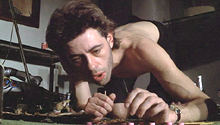 Geldof's portrayal of Pink's madness is both chilling and mesmerizing. |
But trying to get a good idea of what the main players thought of him is all very interesting. Roger Waters: "Seeing him do it, I know he's doing a hell of a lot better than I could have ever done." Which isn't as obviously flattering as it may at first seem. In another, later, interview Waters explains "There was never any pussyfooting about what he thought about Pink Floyd or the music, because he was extremely scathing about the whole thing and I never tried to persuade him differently. You know, these bog Irish, you can't tell them anything; they wouldn't understand. I'm not going to waste my time on Geldof, trying to explain The Wall to him. He understands; he just doesn't realize he understands. If there's one man in the world who understands, it's got to be Geldof. Bless him."
But we shall leave it to the director to make the most appropriate claim at the time. Alan Parker: "No director ever got a performance out of an actor that wasn't already there to start with." As he says this, the behind-the-scenes film shows Geldof questioning, listening and practicing; working with Parker's suggestions just as Parker is working with Geldof's talents.
Giving his all for the filming, Geldof recounts in an interview with Jim Ladd the trials and tribulations of trashing the hotel room for the benefit of art and how all he managed to do was nauseate himself through what he managed to say to his co-star in the scene, Jenny Wright. As he abused her and far too many perfectly innocent musical instruments, Geldof swung from said nausea to laughter as he couldn't quite keep it up. But for me, far more impressive is the real damage he does to his hand when he breaks the slats in the wardrobe doors (he even looks at his hand as he does it), which is then bandaged for the remaining few seconds of the scene. A brave Bob indeed giving it all up for the art.
He was a bit of a wag at times as well. In the studio (Henley Manor House), while re-recording two versions of "In the Flesh" for the film, he caused David Gilmour a bit of heart trouble (as Geldof recalled in his autobiography Is That It?) by singing the first few takes in a heavy Irish accent, a "drunken farmer at a Kerry agricultural show" sort of voice; not exactly what was needed. Once completed properly, Gilmour's only response was "You bastard!" Oh, to hear an outtake!
After the film was released, most reviews of Geldof's efforts were favourable. And he has certainly garnered many more favourable reviews than the film itself. "I was terrified to see the film," Geldof says. "It was only when it was shown in Cannes that I had the courage to creep into the screening. I told the director not to be offended if I walked out the first time I saw it." (Sunday Magazine, July 1982)
"A natural actor if ever there was one," said David Dalton in Music Week, July 1982.
But others were more than happy not to be so nice. The Sunday Times wrote of "Bob Geldof's agonized playing", and the Sunday Tribune said that "Geldof is no more than a prop, a device upon which to hang largely visual abuse."
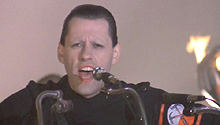 Geldof re-recorded "In the Flesh" for the film. |
But all of this is mere fluff to what really matters, and that is Geldof's performance. All the documentaries and articles in the world can't do it justice, and all one need do is watch the film. With no acting experience, and the hard heads of Parker and Waters in the gloom behind the cameras, Bob Geldof performs brilliantly in his one and only major film role. The power of his Nazi-like rants, his maddened fits in the hotel pool or asylum, or the lonely, sad, and helpless efforts of the abandoned husband all add up to the perfect accompaniment to Pink Floyd's masterpiece. Alan Parker explains how he looked high and low for an actor who could sing, and only once he had failed did he realize he needed a singer who could act. And he found the perfect one in Bob Geldof. Many a time over the past twenty years I have tried to think of someone--anyone--who may have done as good a job, and I have failed. But that doesn't surprise me at all.
To end, I shall leave with the end of an interview with Geldof in a recent issue of Record Collector (2004).
Record Collector: How do you want to be remembered?
Bob Geldof: I don't give a flying fuck how I am remembered.
RC: Okay, how do you think you will be remembered?
BG: He's that bloke that put on that concert. What was that again?
Well Mr. Geldof, I can guarantee you that there is one fan out there at least that will not only remember your name, but for all the other things you have done. 'That concert' is quite a ways down the list.
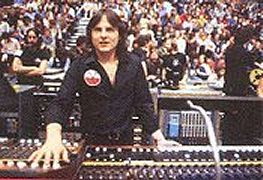 James Guthrie at the mixing desk during The Wall shows (live 1980-81) |
Remaster-er extraordinaire and unofficial 'liaison' for the band since the 1985 split, Guthrie first became involved with Pink Floyd when he was brought in to co-produce The Wall (1979) sessions, for which he also shared mixing and engineering duties with producer Bob Ezrin. Guthrie received a Grammy award for Best Engineered Recording of 1980 (he had also won an NME Award for Best British Engineered Record 1979 for Marshall Hein's Free Ride). He subsequently mixed The Wall live performances and was the Front-Of-House mixer (1980-81) as well as recording supervisor for the live shows. He mixed Nick Mason's first solo album Fictitious Sports (1981) and he co-produced and engineered the 1981 version of "Money" in A Collection Of Great Dance Songs (1981). He produced (with Waters, Gilmour, and Michael Kamen), mixed and engineered the film soundtrack for Pink Floyd The Wall (1982) assisted by Andy Jackson, among others. In 1983, Guthrie and his team received an Excellence In The Craft Of Sound BAFTA Award for their work on the film. The film soundtrack spawned the 7" single Music From The Film (1982), which contained "When The Tigers Broke Free"/"Bring The Boys Back Home", produced by Waters, Gilmour, Guthrie and Kamen. He produced (with Waters and Kamen) and engineered (with Andy Jackson) The Final Cut (1983). The "Max" character, referred to by Waters in "The Gunner's Dream" was Guthrie's nickname during the sessions. Guthrie also mixed Gilmour's About Face (1984) solo album a year later and was credited in Momentary Lapse Of Reason (1987) for 'additional mixing' on "Yet Another Movie". On the eve of Pink Floyd's 1987 tour, he was brought in to introduce Floyd newcomer Buford Jones to the technicalities of mixing the band's live sound. He supervised the digital remastering of the albums included in the Shine On (1990) box set, along with the ensuing 1994-95 Digital Remaster series of the band's back catalogue, which were remastered by Doug Sax (another frequent name in Floyd credits) in the LA-based Mastering Lab. Two years later, he mixed Waters' Amused To Death (1992).
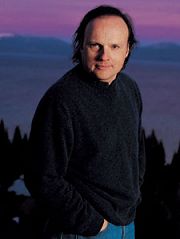 James Guthrie in 2003 |
Although Guthrie did not have any direct involvement in The Division Bell (1994) he was in charge of the recording of Pink Floyd's 1994 World Tour, which included the recording, mixing, compilation, and production (with Gilmour) of the tracks for p.u.l.s.e. (1995) and of "Astronomy Domine (live)" and "One Of These Days (live)" released as 'B-sides' of the "Take It Back" (1994) and "High Hopes" / "Keep Talking" (1994) singles respectively. He was also in charge of the production and mixing of the audio side of the p.u.l.s.e. VHS release. In 1996, he mixed Rick Wright's latest solo album, Broken China (1996). For the 20th anniversary of The Wall, he compiled, restored, engineered, mixed and remastered the live tapes for Is There Anybody Out There? The Wall Live 1980-81 (2000) project. Soon after, he was busy again compiling tracks which he re-remastered and mixed/segued together for Echoes - The Best of Pink Floyd (2001), a 2-CD retrospective which he also produced with the 'active involvement' (and production credit) of all four band members. Perhpas inadvertently, he ended up acting as a liaison (Gilmour and Waters have still not spoken since 1987), co-ordinating the project remotely and sending disc samples to each member during the poject's various stages. He was in charge of recording Waters' In The Flesh - Live 2000 shows for both the Audio CD and DVD release, which he also produced and mixed in 5.1 Dolby Surround sound. He mixed and co-produced Waters' Flickering Flame (2002) compilation and also mastered David Gilmour In Concert (2002) live DVD. He remixed The Dark Side of the Moon 30th anniversary edition (2003) SACD in 5.1 Surround sound (a process which involved mastering from scratch after locating the individual multi-track tapes and synchronising them afresh). In 2003, he remastered The Final Cut which was released in 2004 as an 'extended' anniversary edition CD, featuring a new remix of the 1982 recording of "When The Tigers Broke Free". Guthrie has been working on the long-awaited surround mix of the upcoming DVD release of Pink Floyd's p.u.l.s.e., from his California-based studio, while work for the DVD is also being carried out in Astoria, Gilmour's London studio, with engineer and one-time Guthrie protégé Andy Jackson. In summary, Guthrie has worked on just about every Floyd-related project since 1979, be it by Floyd or by solo Gilmour, Waters, Mason or Wright and has been the band's confidante in matters of studio and live sound mixing. He is one of the precious few people who keep working closely for both 'camps' after the split: post-1987 Pink Floyd and solo Roger Waters.
FLOYDIAN SPAN:
1978 - 2003
FLOYDIAN RELATIONS:
Pink Floyd (1978-1983, 1987-2003);
Nick Mason (1981); David Gilmour (1984, 2002);
Roger Waters
(1992, 2002);
Rick Wright
(1996)
FLOYD ALBUMS:
:: The
Wall (1979) / co-production; mixing; engineering
:: Fictitious Sports (1981) / mixing
:: A Collection Of Great Dance Songs (1981) / co-production; engineering
:: Music From The Film (1982) single /
production; engineering; mixing
:: The Final Cut (1983) / production; engineering; mixing; 2004 extended
edition remastering
:: About Face (1984) / mixing
:: A Momentary Lapse Of Reason (1987) / additional mixing
:: Shine On (1990) / remastering supervision
:: Amused To Death (1992) / mixing
:: Back Catalogue Digital Remaster series (1994-95) / remastering
supervision
:: Take It Back / Astronomy Domine (live) (1994) single / production;
recording; mixing
:: High Hopes / Keep Talking / One Of These Days (live) (1994) single /
production; recording; mixing
:: p.u.l.s.e. (1995) / live recording; compilation; production; mixing
:: Broken China (1996) / mixing
:: The
Wall DVD (2000) / sound remastering; remixing
:: Is There Anybody Out There? The Wall Live 1980-81 (2000) /
compilation; mixing; production
:: Echoes - The Best Of Pink Floyd (2001) / production; compilation; remastering
:: In The Flesh-Live (2001) / sound recording; production; mixing
:: Flickering Flame - The Solo Years vol. 1 (2002) / mixing;
co-production
:: David Gilmour In Concert (2002) / sound mastering
:: The Dark Side Of The Moon 30th anniversary SACD (2003) / remastering;
5.1 Surround remixing;
FLOYD LIVE CONCERTS/TOURS & OTHER PROJECTS:
Pink Floyd - The Wall Performed Live (1980-81) / Live sound mixing; engineering;
recording supervision
Pink Floyd - The Wall - Film (1982) / production; engineering; mixing
Pink Floyd - Momentary Lapse Tour (1987) / mixing assistance to Buford Jones
(pre-production stage)
Pink Floyd - The Division Bell World Tour (1994) / live recording
Snowy White - Goldtop (1995) / remastering; remixing of
"Pigs On The Wing"
Roger Waters - In The Flesh (2000) / live mixing; recording
• • •
MICHAEL KAMEN (orchestral arrangements; conduction; piano; keyboards; english horn)
The late Michael Kamen has had a tremendous musical career, during which he collaborated with Pink Floyd on multiple occasions. Kamen first worked with Floyd in 1979, when he was asked to arrange orchestral scores (devised by Bob Ezrin) for The Wall (1979) and conduct the orchestra. He subsequently worked for The Wall - Music From The Film (1982), which he also produced with Waters, Gilmour, and James Guthrie. Kamen also arranged several of the songs that were re-recorded for the film, including "When The Tigers Broke Free", "Mother", and "Bring the Boys Back Home". He played piano, organ, and harmonium, contributed orchestral arrangements, and produced The Final Cut (1983) with Waters and Guthrie. He also contributed piano, orchestral arrangements, and conduction to Waters' The Pros and Cons of Hitch Hiking (1984) which, again, he produced with him. Interestingly enough, he also provided orchestral arrangements and conduction in Gilmour's About Face, that same year (1984). He also accompanied Waters as a member of his touring band, with Eric Clapton, Andy Fairweather-Low, Tim Renwick, Mel Collins and others.
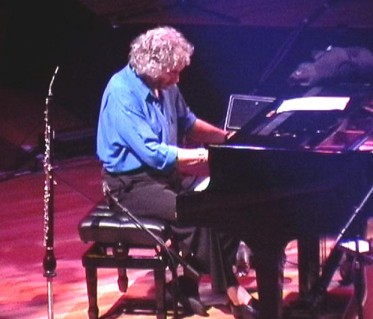 Michael Kamen playing piano and english horn with David Gilmour in Royal Festival Hall (2002). |
Kamen provided extra keyboards during "Comfortably Numb" in the Knebworth '90 concert, which the Gilmour-led Floyd headlined; and less than a month later he also provided orchestral arrangements and conduction in Waters' The Wall Live In Berlin (1990) extravaganza. His orchestral scores were to be featured again on both Waters' Amused To Death (1992) and Pink Floyd's The Division Bell (1994). Before his untimely death, he performed with Gilmour in the latter's 2001 Meltdown concert and again in Gilmour's 2002 London and Paris concerts, He can be seen playing piano and english horn in the David Gilmour In Concert (2002) live DVD.
FLOYDIAN SPAN:
1979 - 2002
FLOYDIAN RELATIONS:
Pink Floyd (1979, 1982, 1983, 1990, 1994);
Roger Waters (1984, 1990, 1992); David Gilmour (1984,2001,2002)
FLOYD ALBUMS:
:: The
Wall (1979) / orchestral arrangements; conduction
:: Music From The Film (1982) single /
production; arrangements
:: The Final Cut (1983) / production; piano; keyboards; orchestral
arrangements; conduction
:: The Pros And Cons Of Hitch Hiking (1984) / production; piano;
orchestral arrangements; conduction
:: About Face (1984) / orchestral arrangements; conduction
:: Knebworth '90 (1990) / additional keyboards
:: The Wall Live In Berlin (1990) / orchestral arrangements;
conduction
:: Amused To Death (1992) / orchestral arrangements; conduction
:: The Division Bell (1994) / orchestral arrangements; conduction
:: David Gilmour In Concert (2002) / piano; english horn
FLOYD LIVE CONCERTS/TOURS & OTHER PROJECTS:
Pink Floyd - The Wall - Film (1982) / production; arrangements; orchestra
conduction; keyboards
Roger Waters - The Pros And Cons Of Hitch-Hiking Performed
Live (1984) / piano; keyboards
Pink Floyd - Knebworth '90 (1990) / additional keyboards
Roger Waters - The Wall Live In Berlin (1990) /
orchestra conduction; arrangements
David Gilmour - Meltdown (2001) & Royal Festival Hall / (2001-2)
/ piano; english horn
• • •
NICK GRIFFITHS (engineering; mixing; production)
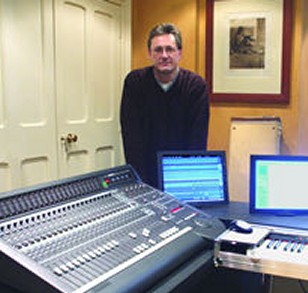 Nick Griffiths sitting in the middle of Roger Waters' latest portable studio rig, which he devised for him (2002). |
Nick Griffiths first became associated with a Floyd member when he engineered Music For Pleasure (1977) by The Damned, which was produced by Nick Mason. He then went on to engineer Gilmour's David Gilmour (1978) and Wright's Wet Dream (1978), although he is not always credited for the latter. Both solo albums were recorded at Super Bear studios in France. After having collaborated with 3/4 of the Floyd, he become part of the team of engineers for The Wall 1978-79 sessions, parts of which took place at Britannia Row Studios and Super Bear. Griffiths was also specifically responsible for the recording of sound effects for the album and for getting the 4th-form school children of the 23 Islington Green School (led by Noel Davis) to sing the famous "We don't need no education" chorus. He engineered Mason+Fenn's Profiles (1985) and then collaborated with Waters, co-producing and engineering his part of the soundtrack of When The Wind Blows (1986). He also assisted Waters' Radio K.A.O.S. (1987) sessions at the pre-production stage and produced (with Waters and Ian Ritchie) some of the tracks. He was involved with the live sound engineering and mixing of The Wall Live In Berlin (1990), and he recorded, engineered, and co-produced Waters' Amused To Death (1992). He was the live sound engineer of Waters' In The Flesh-Live 1999-2000 tour (mixed by James Guthrie) and can be seen in the 'Behind The Scenes' section of the DVD. He was also involved with some of the new tracks that appeared in Waters' Flickering Flame (2002), a compilation produced and mixed by Guthrie (with Waters). Griffiths mixed the "Lost Boys Calling (original demo)" and produced (with Waters) "Flickering Flame (new demo)". He recently remixed and remastered The Wall Live In Berlin DVD reissue in Dolby 5.1 Surround sound. In addition to his early work with Mason, Gilmour and Wright, and -of course- The Wall, Griffiths has been involved with all of Waters' studio and live projects since 1986 and was also responsible for building Roger's triple-rig portable Macintosh G4 / Mackie console / Logic Audio Pro studio setup (part of which is shown in the picture above).
FLOYDIAN SPAN:
1977 - 2002
FLOYDIAN RELATIONS:
Nick Mason (1977, 1985); David Gilmour (1978);
Rick Wright (1978); Pink Floyd (1978-79);
Roger Waters
(1986, 1987, 1990, 1992, 1999-2002)
FLOYD ALBUMS:
:: Music For
Pleasure (1977) / engineering
:: David Gilmour (1978) / engineering
:: Wet Dream (1978) / engineering
:: The Wall (1979) / engineering
:: Profiles (1985) / engineering
:: When The Wind Blows (1986) / co-production; engineering
:: Radio K.A.O.S. (1987) / co-production
:: The Wall Live In Berlin (1990) / Live engineering; mixing
:: Amused To Death (1992) / recording; engineering; co-production
:: The Wall Live In Berlin (1990) / Live engineering; mixing
:: Flickering Flame - The Solo Years vol. 1 (2002) / production; co-production;
mixing; engineering
:: The Wall Live In Berlin (2003) DVD / remastering; Surround 5.1
remixing
FLOYD LIVE CONCERTS/TOURS & OTHER PROJECTS:
Roger Waters - The Wall Live In Berlin (1990) /
live engineering; mixing
Roger Waters - In The Flesh (1999-2000 & 2002) /
live engineering
• • •
ANDREW JACKSON (engineering; mixing; production)
 |
Andrew (Andy) Jackson first got involved with the Floyd through James Guthrie, under whom he was trained as an engineer. He assisted Guthrie with some of the recording of the 1981 Earl's Court shows (some of which surfaced on Is There Anybody Out There?, although Jackson's name is not included in the credits). His other Floyd-related credentials up until then included engineering "I Don't Like Mondays" by The Boomtown Rats (Bob Geldof's band before his acting role in The Wall film). By the time Waters, Gilmour, Guthrie and Kamen had started work for the remixing of the music for the film soundtrack in 1982, Andy Jackson was called to help with the soundtrack remixing and engineering. After the film soundtrack was completed, the sessions continued as the 'Spare Bricks' project, which soon evolved into The Final Cut (1983), which Jackson engineered along with Guthrie. Jackson went on to engineer (without Guthrie) Roger's The Pros and Cons of Hitch Hiking (1984) and, concurrently, Gilmour's About Face (1984) solo records. It may seem rather curious that both Jackson and Kamen worked for the two 'opposite' camps in 1984 but, as this article illustrates, this was by no means the only case where Gilmour/Floyd & Waters 'shared' collaborators. Jackson subsequently went on the road with Waters, mixing the live sound in the The Pros and Cons of Hitch Hiking 1984 tour, which involved Eric Clapton, Tim Renwick and Andy Fairweather-Low, one of Roger's closest associates. He was then called to work on the 'next Floyd project' in 1986, engineering A Momentary Lapse of Reason (for which he received a Grammy nomination) and providing additional sound effects (like the alarm sounds in "One Slip"). He has worked with Pink Floyd and Gilmour since, becoming the live engineer for the Amnesty International 30th anniversary concert (1991) for which Gilmour was the 'musical director', performing with Tim Renwick, Jon Carin, Gary Wallis, Sam Brown, and Durga McBroom, among other Floyd associates. He also engineered the band's sessions for the soundtrack of La Carrera Panamericana (1992) and then The Division Bell (1994), which earned him a second Grammy nomination.
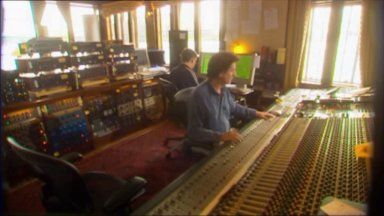 Andy Jackson sitting at the mixing desk of |
Jackson went on the road with the Floyd in their 1994 World Tour, and was their live front-of-house engineer, the recordings of which resulted in the p.u.l.s.e. (1995) album and video. Jackson engineered and mixed Gilmour's live Meltdown (2001) and 2002 Royal Festival Hall concerts, which were released as the In Concert (2002) DVD, co-produced by himself and mastered by him and Guthrie. He is also the resident engineer in charge of Gilmour's Astoria houseboat studio, and is doing a lot of engineering and production work there, some of which occasionally feature Floyd collaborators, such as Jon Carin (for The Fields' Elizium album) or Gary Wallis (for Jackson's own solo effort, Obvious). Jackson is also involved in the upcoming remix of the p.u.l.s.e. DVD that has been taking place -on and off- for the last few years, in Astoria. Apparently, Gilmour has his own designated chair in Astoria's mixing desk, located in the 'sweet spot' for the 5.1 surround sound experience.
FLOYDIAN SPAN:
1981 - 2002
FLOYDIAN RELATIONS:
Pink Floyd (1981, 1982, 1983, 1987, 1992, 1994, 1995);
David Gilmour
(1984,1991,2001,2002); Roger Waters
(1984)
FLOYD ALBUMS:
:: Music From The Film (1982) single /
engineering
:: The Final Cut (1983) / engineering
:: The Pros And Cons Of Hitch Hiking (1984) / engineering
:: About Face (1984) / engineering
:: A Momentary Lapse Of Reason (1987) / engineering; sound effect
recording
:: La Carrera Panamericana (1992) / engineering
:: The Division Bell (1994) / engineering
:: p.u.l.s.e. (1995) / engineering; live mixing
:: Is There Anybody Out There? The Wall Live 1980-81 (2000) / live
recording assistance
:: David Gilmour In Concert (2002) / sound engineering; mixing;
co-production
FLOYD LIVE CONCERTS/TOURS & OTHER PROJECTS:
Pink Floyd - The Wall Performed Live (1981) / Live
recording (assistant to James Guthrie)
Pink Floyd - The Wall - Film (1982) / production; engineering; mixing
Roger Waters - The Pros And Cons Of Hitch Hiking tour (1984) / live mixing;
engineering
Amnesty International 30th anniversary concert (1991) / engineering
(with Gilmour, Carin, Renwick et al.)
Pink Floyd - The Division Bell World Tour (1994) / live Front-Of-House
mixing
David Gilmour - Meltdown (2001) / "In Concert" (2002) / live
engineering; mixing
• • •
JON CARIN (keyboards; synthesizers; programming; vocals; guitar)
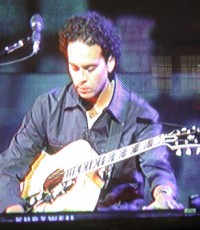 Jon Carin on synthesizers and guitar, playing with Roger Waters live (2000) |
Jon Carin first met Gilmour through Live Aid (1985) as part of Bryan Ferry's backing band, in which Gilmour played guitar. He co-wrote "Learning To Fly" with Gilmour, Bob Ezrin and Anthony Moore, and he handled samplers in A Momentary Lapse Of Reason (1987). He accompanied Pink Floyd as an additional keyboard player and backing vocalist during their Momentary Lapse of Reason tour (1987-88) which produced the live album Delicate Sound Of Thunder (1988), and again in their Another Lapse (1989) world tour and their headlining 1990 performance at Knebworth, which produced the live Knebworth '90 album and video. He contributed keyboards and vocals in the Amnesty International 30th anniversary concert (1991), for which Gilmour was the musical director, and also included Floyd collaborators Tim Renwick, Gary Wallis, Sam Brown, Durga McBroom and Andy Jackson, among others. He worked with Gilmour on "film project" sessions which produced Gilmour's soundtrack for Ruby Takes A Trip (1991) and The Colours Of Infinity (1992) and he provided additional keyboards in Floyd's La Carrera Panamericana (1992), as well as in the Chelsea Arts Ball Benefit concert (1992) which featured a band with Gilmour, Guy Pratt, Renwick, Wallis, Sam Brown, plus Wright and Mason as guest musicians.
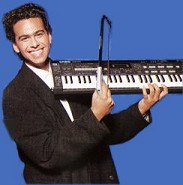 Jon Carin posing for Pink Floyd's "Momentary Lapse Of Reason" Tour Programme (1987-88). |
He contributed additional keyboards and programming in The Division Bell (1994) and performed live with Pink Floyd in their 1994 World Tour, which produced the live album p.u.l.s.e. (1995). In 1996 he appeared with Gilmour in the 'reunion' concert of Pete Townshend, Roger Daltrey, and John Entwistle of The Who, and again with Townshend in the 1996 presentation of Quadrophenia, on both of which Gilmour also performed.
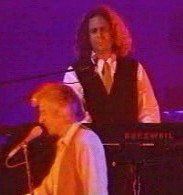 Carin with Wright during Pink Floyd's 1994 tour. |
He joined Waters' live band and contributed synthesizers, guitar, lap-steel, and vocals in Waters' 1999-2000 tour, which yielded the In The Flesh-Live (2001) album and DVD. He played keyboards in "Flickering Fame (new demo)", which was included in Waters' Flickering Flame - The Solo Years vol.1 (2002) and has contributed to the sessions of Waters' upcoming studio album. He has collaborated with Andy Jackson, playing on Elizium (2001) by The Fields, which Jackson produced. Apart from having worked with several live bands that have included Gilmour and other members of Floyd's touring personnel (including Gary Wallis and Tim Renwick), Jon Carin has been Pink Floyd's second keyboardist since 1987, contributing on every Floyd release to date and handling most of the sampling/programming aspects during the live shows, leaving Wright a more 'traditional' Hammond organ / piano / lead synthesizer role. Following Floyd's inactivity since 1994, Carin joined Waters' camp, receiving praise by Wright himself for his keyboard work in Roger's recent live shows.
FLOYDIAN SPAN:
1985 - 2002
FLOYDIAN RELATIONS:
David Gilmour (1985, 1991, 1992); Pink Floyd (1987-1990, 1994);
Roger Waters
(1999-2000,2002)
FLOYD ALBUMS:
:: A Momentary
Lapse Of Reason (1987) / samplers; co-writing
:: Delicate Sound Of Thunder (1988) / keyboards, samplers; vocals
:: Knebworth '90 (1990) / keyboards, samplers; vocals
:: La Carrera Panamericana (1992) / additional keyboards
:: The Division Bell (1994) / additional keyboards; programming
:: p.u.l.s.e. (1995) / keyboards, samplers; vocals
:: In The Flesh-Live (2001) / synthesizers; acoustic guitar, lap-steel
guitar; vocals
:: Flickering Flame - The Solo Years vol. 1 (2002) / keyboards
FLOYD LIVE CONCERTS/TOURS & OTHER PROJECTS:
Bryan Ferry - Live Aid (1985) / keyboards (with Gilmour on guitar)
Pink Floyd - Momentary Lapse Of Reason (1987-89) tours / keyboards;
samplers; vocals
Pink Floyd - Knebworth (1990) concert / keyboards;
samplers; vocals
Amnesty International 30th anniversary concert (1991) / keyboards
(with Gilmour, Renwick, Jackson et al.)
David Gilmour - Ruby Takes A Trip / Colours Of Infinity (1991) film
projects / samplers
Chelsea Arts Ball Benefit Concert (1992) / keyboards
(with Gilmour, Renwick et al., with Wright & Mason as guests)
Pink Floyd - The Division Bell 1994 World Tour (1994) / keyboards;
samplers; vocals
The Who - Quadrophenia (1996) / keyboards (with Gilmour on guitar)
Roger Waters - In The Flesh (1999-2000 & 2002) /
synthesizers; guitar; lap-steel guitar; vocals
• • •
SNOWY WHITE (guitars; bass)
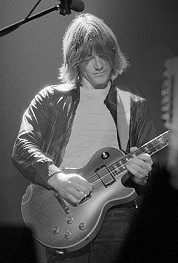 Snowy White playing live with Floyd in the 1977 tour. |
Terence 'Snowy' White was brought in by Gilmour as a second guitarist for Pink Floyd's Europe '77 and In The Flesh (1977) tours. Before even starting rehearsals with them, he recorded a lead guitar solo that was used in "Pigs On The Wing" for the cartridge version of Animals (1977). This 'composite' version (parts 1 & 2) was later remastered by James Guthrie and re-released in Snowy's Goldtop (1995) retrospective. On Floyd's 1977 tours he played second guitar (mostly rhythm, with the occasional lead solo and some lead duets with Gilmour) and fretless & fretted bass guitars on "Sheep", "Pigs", and "Welcome To The Machine". He played guitar for Wright's Wet Dream (1978) and was a member of the Pink Floyd 'Surrogate Band' in The Wall live shows (1980), playing additional guitar.
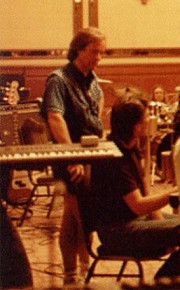 Snowy next to Roger in the Wall Live In Berlin rehearsals (1990) |
Since then, he has joined Waters in the studio for the Radio K.A.O.S. (1987) sessions, although his contributions were not included in the final mix. He then joined Waters again, to play guitar in The Wall Live In Berlin (1990), as part of an all-star cast which also included Michael Kamen, among others, with Nick Griffiths mixing the recordings.
 Snowy White photo from the 1977 Floyd tour programme |
He also recorded guitar for Waters' Amused To Death (1992) sessions, although his contributions were--again--not included in the final album. Gilmour played guitar with him on one track from his Highway To The Sun (1994) solo album, which also appeared in the Goldtop (1995) retrospective (the sleeve notes of which feature a photo of him with Gilmour). Snowy was called again by Waters to join him in his extensive 1999-2000 and 2002 In The Flesh tours. He was one of the three guitarists in a team which also included fellow 'credit-veterans' Nick Griffiths, James Guthrie , and Andy Fairweather-Low. In retrospect, Snowy White has been Roger's persistent choice as a live guitarist; has collaborated with Gilmour; has played guitar for Wright; and has toured with Floyd in 1977 and 1980.
FLOYDIAN SPAN:
1977 - 2002
FLOYDIAN RELATIONS:
Pink Floyd (1977, 1980); Roger Waters
(1987, 1990, 1992, 1999-2002); Rick Wright (1978); David Gilmour (1994)
FLOYD ALBUMS:
:: Animals
8-inch cartridge version (1977) / lead guitar solo on one track
:: Wet Dream (1978) / guitars
:: The Wall Live In Berlin (1990) / guitars
:: Is There Anybody Out There? The Wall Live 1980-81 (2000) / guitar
:: In The Flesh-Live (2001) / guitars
FLOYD LIVE CONCERTS/TOURS & OTHER PROJECTS:
Pink Floyd - Europe '77 / In The Flesh (1977) / additional guitar & bass
Pink Floyd - The Wall Performed Live (1980) / additional guitars
Roger Waters - Radio K.A.O.S. (1987) / recording sessions (not used)
Roger Waters - The Wall Live In Berlin (1990) / guitars
Roger Waters - Amused To Death (1991-92) / recording sessions (not used)
Snowy White - Highway To The Sun (1994) / guest contribution by Gilmour on one track
Snowy White - Goldtop (1995) / remastering by James Guthrie / guest
contribution by Gilmour
Roger Waters - In The Flesh (1999-2000 & 2002) /
guitars
• • •
TIM RENWICK (guitars)
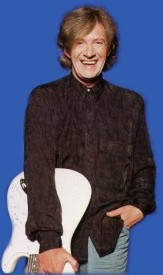 Tim Renwick circa 1987 |
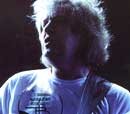 Tim Renwick in 1994. |
Tim Renwick's association with Floyd goes back much further than his recording credits suggest. He was part of the 'Cambridge mafia' along with Barrett, Waters, Gilmour, Dick Parry, et al. Although younger, he was a friend of Gilmour's and--according to his own admission--an early fan of his guitar playing. He had worked with Cambridge-based bands, including Sutherland Brothers and Quiver, which also featured Willie Wilson (see photo below), Floyd associate and drummer of Gilmour's pre-Floyd band Joker's Wild. Renwick and Wilson had also recorded with Dick Parry. One of Renwick's first remote, yet amusing, connections with the Floyd came in 1969 when he recorded with Junior's Eyes an album titled... Battersea Power Station! Among the many famous names he has worked with, we should mention Paul McCartney (with whom Gilmour has repeatedly recorded and played) and Al Stewart's band, whose albums Alan Parsons has produced; Renwick would later collaborate with The Alan Parsons Project as well. He has also played for Mike and The Mechanics, whose core members Mike Rutherford and Paul Carrack have collaborated with Gilmour and Waters. Renwick's 'second-degree' associations with people Floyd have also been associated goes to show how music business works.
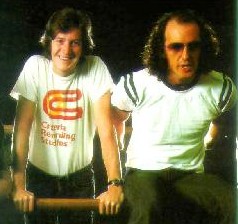 Tim Renwick (left) and Willie Wilson (right) |
On a more tangible level, Renwick was first summoned by Waters to perform with his live touring band in the 1984 Pros And Cons shows, which also featured Eric Clapton and Andy Fairweather-Low, another 'permanent' Roger collaborator who, incidentally, has also collaborated with Gilmour. Renwick said he had the task of transcribing the whole of Floyd's back catalogue for Waters to select which pieces were to be performed. This would soon prove handy, as he left Waters' camp and, after joining Eric Clapton's band (which also included Fairweather-Low) started a long-term collaboration with the Gilmour-led Floyd, performing songs from that very same back catalogue. He played second guitar in the 1987-89 Momentary Lapse Of Reason live tours, in Knebworth '90 (1990), in La Carrera Panamericana (1992) and The Division Bell (1994). He was part of the touring band in the 1994 world tour and hence in p.u.l.s.e. (1995) too, and he also played guitar in Rick's Broken China (1996). He has played in numerous live events with other Floyds associates, including the Amnesty International 30th anniversary concert, The Who reunion concerts, and other benefit events where Gilmour and Jon Carin were also involved.
FLOYDIAN SPAN:
1968 - 1996
FLOYDIAN RELATIONS:
Pink Floyd
(1987-89, 1990, 1992, 1993-94); David Gilmour (1968, 1991, 1996); Rick
Wright (1996)
FLOYD ALBUMS:
::
Delicate Sound Of Thunder (1988) / guitars
:: La Carrera Panamericana (1992) / additional guitar
:: The Division Bell (1994) / additional guitar
:: p.u.l.s.e. (1995) / guitars
:: Broken China (1996) /
guitars
FLOYD LIVE CONCERTS/TOURS & OTHER PROJECTS:
Roger Waters - The Pros And Cons Of Hitch Hiking (1984) / guitars
Pink Floyd - Momentary Lapse Of Reason (1987-89) tours / guitars
Pink Floyd - Knebworth '90 (1990) concert / guitars
Amnesty International 30th anniversary concert (1991) / guitar
(with Gilmour, Carin, Jackson et al.)
Chelsea Arts Ball Benefit Concert (1992) / guitar (with Gilmour, Carin et al.
and Wright & Mason as guests)
Pink Floyd - The Division Bell 1994 World Tour (1994) / guitars
The Who - Quadrophenia (1996) / guitar (with Gilmour on
guitar)
• • •
BOB EZRIN (production; keyboards; arrangements; percussion)
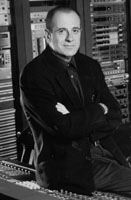 Bob Ezrin posing in the studio |
Bob Ezrin knew Waters through his wife and met the band during Floyd's ill-fated 1977 shows in Canada, where Ezrin lived. It was in the back of a limousine on the way to Ontario in 1977 that Waters first discussed the idea of building a wall between him and the audience, to which Ezrin flippantly replied, "Then why don't you?" (although he admitted he "honestly never expected anything to come of it"). Ezrin was brought in as an external producer for The Wall sessions. In fact, so was James Guthrie, which originally made the situation slightly confusing. But it was Ezrin, an experienced producer and accomplished musician himself, who took the role of the arbiter in most aspects to do with engineering, recording, mixing, mastering and production, both in terms of sound and in terms of the project's flow (continuity) and fine details. A characteristic example of his influence was the hit single "Another Brick In The Wall Part 2", the final version of which was Ezrin's idea, after suggesting that the band should try using a 4/4 disco tempo on a few tracks. The repetitive drum beat suited the song's school oppression theme and Ezrin insisted the band should cut the track as a single. The band allegedly refused but Ezrin (the man behind Alice Cooper's "School's Out") took the liberty to ask Nick Griffiths back in England to record school children singing the verses. Griffiths sent the recording back and Ezrin with Guthrie extended the track by 'splicing' the school choir verses after Waters' and Gilmour's lead vocals, thereby becoming partly responsible for the 1970s' last and 1980s' very first No.1 single. Ezrin also played a lot of the synthesizer overdubs recorded after Wright got infamously sacked from the band. He arranged the orchestral scores with Michael Kamen, and helped Mason with the drums and percussion, teaching Mason to read drum scores. In a strange twist of events that hints at the intensity of the sessions, Ezrin was 'banned' by Waters from Floyd's camp after the record was finished, due to leaking information about the band's live dates to the press. Ezrin was only 'unofficially' present in one of The Wall concerts, attending as a member of the audience the show he had helped the band to devise.
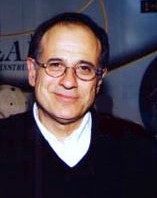 Bob Ezrin in a more recent photo |
His next involvement with a member of the band was in 1984 when he was asked to produce About Face (1984) with Gilmour. Ezrin also played keyboards and arranged orchestral scores with Michael Kamen once again. In 1986 he turned down Roger's invitation to produce his Radio K.A.O.S. project and chose to co-produce A Momentary Lapse Of Reason (1987) with Gilmour instead. The album was produced by him and Gilmour and, as in The Wall, he was very much involved with keyboards and percussion, and also with samplers, sequencing and programming that was new to the band. He co-wrote two tracks and was, arguably, in charge of the album's sound and direction at least as much as Gilmour, and clearly more than Mason or (the hastily 'reinstated') Wright. He assumed a similar role in The Division Bell (1994) which he, again, produced with Gilmour, providing additional keyboards, programming, and percussion, although Wright and Mason were evidently back in form by then. His other association with Floyd projects includes the production of the second (and last) Kula Shaker album at Gilmour's Astoria studio in 1999. Kula Shaker's first album, K (1996) was produced by John Leckie, who, before producing the likes of Stone Roses and Radiohead, was a tape operator and engineer for Floyd projects during 1970-1975.
FLOYDIAN SPAN:
1978 - 1994
FLOYDIAN RELATIONS:
Pink Floyd (1978-79, 1986-87, 1993-94);
David Gilmour (1984)
FLOYD ALBUMS:
:: The
Wall (1979) / production; orchestral arrangements; keyboards; percussion
:: About Face (1984) / production; orchestral arrangements; keyboards
:: A Momentary
Lapse Of Reason (1987) / production; keyboards; samplers; sequencers;
programming; percussion
:: The Division Bell (1994) / production; keyboards; programming;
percussion
• • •
In addition to the names listed above, the following people have also been associated with Floyd projects several times in the past, and a brief overview of their contributions is listed below.
DICK PARRY (1968, 1973, 1974, 1975, 1977, 1994, 2001, 2002, 2003)
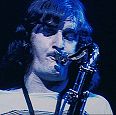 |
Dick Parry has been a Cambridge friend of Gilmour's who had already recorded with Tim Renwick and Quiver before his first official session with the Floyd in 1972-73. He played saxophone on The Dark Side of the Moon (1973), the 1973-75 tours, Wish You Were Here (1975), and in Floyd's Europe '77 / In The Flesh (1977) tours. He was recruited again in 1994 to play sax on The Division Bell (1994) and the 1994 tour, which produced p.u.l.s.e. (1995). Parry also joined Gilmour's In Concert (2001-2) shows. He is also said to have played saxophone at Steve O'Rourke's funeral.
WILLIE WILSON
(1965-67, 1970, 1978, 1980, 1981, 1982)
John 'Willie' Wilson played drums with Gilmour in Joker's Wild (1965-67) as well as Sutherland Brothers and Quiver, and has collaborated with Rick Wills (Joker's Wild and David Gilmour bassist), Tim Renwick, Dick Parry, and Jerry Shirley (who also played with Barrett and Gilmour). He contributed drums in The Madcap Laughs (1970) and Barrett (1970) sessions. He played drums with Gilmour and Rick Wills again on David Gilmour (1978) and he was part of the 'Surrogate Band' in The Wall live shows (1980-81), playing drums with Mason. He also contributed drums in The Wall - Music For The Film (1982).
GUY PRATT (1987, 1988, 1989, 1990, 1992, 1993, 1994)
Guy Pratt has been the bassist in post-Waters Pink
Floyd since the Momentary Lapse tours of 1987-89. He also played in
Knebworth '90 (1990), La Carrera Panamericana (1992), The Division
Bell (1994), and the 1994 world tour which produced p.u.l.s.e.
(1995). He turned down Roger's invitation to play bass on Amused To Death
(1992), but has collaborated numerous times with Gilmour, Carin, Wallis,
Renwick, et al. in benefit concerts and other events. He is also married
to Rick Wright's daughter. So, he's officially family now!
And, of course, so is author Polly Samson, Gilmour's wife, who
co-wrote most of the lyrics for The Division Bell (1994), had one song ("Coming
Back To Life") written for her, and had her son, Charlie, name-checked at the very end of the
record. And judging by "Smile", Gilmour's new tune performed at his 2001-2
concerts, she's intending to write the words for more of her husband's tunes.
On the female vocals department, the following ladies have repeatedly left their mark:
 |
SAM BROWN (1984, 1990, 1994, 2001, 2002) & VICKI BROWN (1984, 1987, 1990)
Sam Brown has sung on About Face (1984), Knebworth '90 (1990), The Division Bell (1994), p.u.l.s.e. (1995), and David Gilmour In Concert (2001-2). Gilmour has also contributed guitar to her two solo albums, and they have performed live together several times. Sam has not collaborated with Waters yet, but her mother, the late Vickie Brown has. Vickie Brown provided vocals in Radio K.A.O.S. (1987) but before that she had also sung on About Face (1984) with her daughter, as she did again in Knebworth '90 for the Floyd.
CLARE TORRY (1973, 1987, 1988, 1990)
 |
Clare Torry is known for her improvised vocal part in the studio version of "The Great Gig In The Sky" (1973). She has repeated her performance live four more times: three during Waters' 1987 tour and one for Pink Floyd at Knebworth '90. Torry has also provided vocals in "Four Minutes" from Radio K.A.O.S. (1987). There has recently been some amount of controversy about her alleged claim that she deserves a co-writing credit for Rick Wright's tune.
• • •
Sound Engineering, Mixing, Production:
Sound engineering, mixing, and production (both in the studio or in live situations) is a domain often overlooked, but particularly in Pink Floyd's case has always been of paramount importance. Other than the 'high-profile' names of Guthrie, Griffiths, Jackson, and Ezrin, the following people have had an important role in Floyd's career:
ALAN PARSONS (1970, 1972, 1973, 1974, 1990)
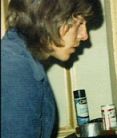 |
Alan Parsons engineered the Beatles' Abbey Road (1969) which Chris Thomas also co-produced, while Floyd were recording Ummagumma (1969) at the same studio. He then engineered and mixed Floyd's Atom Heart Mother (1970). He engineered and co-mixed The Dark Side of the Moon (1973), again with Chris Thomas supervising the mix, and was responsible for some of the record's memorable sound effects (e.g. chiming clocks, footsteps) and for suggesting Clare Torry for "Great Gig In The Sky".
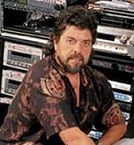 |
He then joined Pink Floyd on the road and became their live front-of-house engineer in 1974. He mixed the quadrophonic version of The Dark Side of the Moon in 1974, with which John Leckie also claims to have had some involvement.
In 1990, he joined James Guthrie and Doug Sax to supervise the remastering of The Dark Side of the Moon for the Shine On box set. Tim Renwick has worked on his solo projects, and Gilmour has contributed to his latest solo album.
BRIAN HUMPHRIES (1969, 1970, 1974, 1975, 1976, 1977)
Brian Humphries engineered the live album of Ummagumma (1969) and Roger Waters' and Ron Geesin's Music From The Body (1970), and then landed himself a job as the Floyd's live mixing engineer in 1974 (starting with the Wembley Arena shows). The band were sufficiently impressed by his live engineering, so he worked with them in the studio in, arguably, two of the most complex--from an engineering point of view--albums of their career: Wish You Were Here and Animals. He started working with the band in Abbey Road studios in Christmas 1974 and also went on the road with them in 1975, before engineering the Animals sessions in the--then new--Britannia Row studios in 1976. Following his engineering work for Animals, he also joined the band live in their 1977 tour. He also engineered Music For Pleasure (1977) by The Damned, which Mason produced. After some more work with bands like Squeeze and Pooh, Humphries decided to quit the music business and go fishing--literally!
PETER MEW (1969, 1970, 1971)
 |
 |
Mew engineered the studio album of Ummagumma (1969), The Madcap Laughs (1970), and Syd Barrett's subsequent reissues and remasters. He was also involved with the Meddle (1971) sessions. He is now the senior mastering engineer at Abbey Road Studios and has remastered several reissues for the Beatles (members of which have collaborated with Gilmour) and Deep Purple (whose keyboardist Jon Lord played on Gilmour's About Face). Mew's first engineering job was S. F. Sorrow by The Pretty Things, an album which Gilmour performed at a special anniversary concert.
JOHN LECKIE (1970, 1971, 1974, 1975)
Leckie was an Abbey Road studios tape operator and had worked on Barrett (1970) and Roy Harper's Stormcock (1970) (which was engineered by Alan Parsons). He then engineered Meddle (1971). He also claims to have some involvement in the quadrophonic mixes of The Dark Side of the Moon (1974) with Alan Parsons and Wish You Were Here (1975) with Brian Humphries, despite remaining uncredited for these. Leckie has since become a successful record producer (Simple Minds, Stone Roses, Radiohead, to name but a few) and has also produced Kula Shaker's first album (1996), a band later produced by Bob Ezrin in Gilmour's Astoria studio. It is worth noting that Leckie's interest for bands like Floyd got him into Abbey Road in the first place: for his assessment at college he wrote a thesis on Electronic Music, which included "essays comparing Floyd and Hendrix with Stockhausen and the avant-garde composers". In his own words, "Pink Floyd's Ummagumma really gave me the strong desire to work in a studio and find out how it was all done. I wrote a letter to all the studios and Abbey Road replied and said start on Monday!"
ANTHONY MOORE (1986-87, 1994, 1995-96)
 |
Anthony Moore has studied Indian classical music, worked as a free-lance musician in soundtracks and experimental projects, and worked as a studio producer since 1969, as well being a founding member of Slap Happy. He collaborated with Pink Floyd on their two post-Waters albums, working on "concepts, sounds, and sequencing in their recording studio and contributing lyrics" -as his resume says. His contribution was mostly prominent in A Momentary Lapse of Reason (1987) where, in addition to co-writing many of the songs, he was an advisor in the use of studio technology, sequencers, and samplers. Moore has been a professor (and now principal) in the Academy of Media Arts in Cologne, Germany, working on signal processing, digital recording, and sequencing with computers. He collaborated with Wright in "Wearing The Inside Out" from The Division Bell (1994) and co-wrote, co-produced, and co-engineered Rick's Broken China (1996), whose studio he also helped re-equip in 1995.
PATRICK LEONARD (1986-87, 1992)
Patrick (Pat) Leonard was Madonna's producer when he was brought in on the Momentary Lapse Of Reason (1987) sessions, where he co-composed "Yet Another Movie" and played synthesizer. He then crossed over to Roger's camp, producing Amused To Death (1992), and has been Roger's producer since. Thus, he is among the selected few who started working with the Gilmour-led Floyd and also collaborated with post-Floyd Waters. Leonard's role on Amused To Death (1992) and presumably future studio projects by Roger, is similar to Ezrin's, as he takes an active role in playing keyboards and often contributes to the shaping of the songs in ways more important than what his 'production' credit suggests.
CHRIS THOMAS (1973, 1994)
 |
Chris Thomas was brought in the sessions to supervise the mixing of The Dark Side of the Moon (1973) and did the same in The Division Bell (1994) 21 years later. He was a regular at Abbey Road Studios, and co-produced, among others, The Beatles' White Album (1968) and Abbey Road (1969), which was engineered by Alan Parsons and was recorded in Studio 2 during the same time that Floyd recorded Ummagumma. Thomas has been the long-term producer of Procol Harum, whose engineer Chris Michie replaced Peter Watts as Floyd's soundman at the 1972 Hollywood Bowl gig. Another production credit of Thomas' is Nevermind The Bollocks, Here's the Sex Pistols by The Sex Pistols, whose singer Johnny Rotten was seen wearing the infamous 'I HATE Pink Floyd' t-shirt.
Important Figure in Floyd's Live History:
Last, but not least, the following people deserve to be mentioned, for their long-term involvement in the live performances of Pink Floyd, from the early days of carrying the band's PA in a small van to the latter days of the multi-million-pound spectaculars:
Peter Watts - Floyd's road manager and soundman in the early days, until
his death in 1976.
Alan Stiles - Floyd's
trusty roadie in the early days, commemorated in Alan's Psychedelic Breakfast.
Stiles and Watts are seen in the equipment photo at the rear cover of
Ummagumma.
Chris Adamson - road
manager (since 1971). Can be seen in Live at Pompeii and the Classic
Albums DVD.
Seth Goldman
- road manager (1970-1973) / dedicated live monitor mixing engineer (1973-1994).
Mick Kluczynski - road
manager (since 1972) / live mixing engineer (1973-1975) / production manager
(1977).
Robbie Williams - road manager (1973-1990) / production director
(1994) / Britannia Row Productions manager 1984-1991 (it was purchased from the
band and became an independent company).
Phil Taylor -
guitar/equipment technician since 1974 / backline chief technician /
Astoria studio design & equipment / equipment technician for Floyd, Gilmour
& Wright projects until this day.
Mark Fisher & Jonathan Park - stage design for
Floyd, Waters-solo and post-Waters Floyd shows.